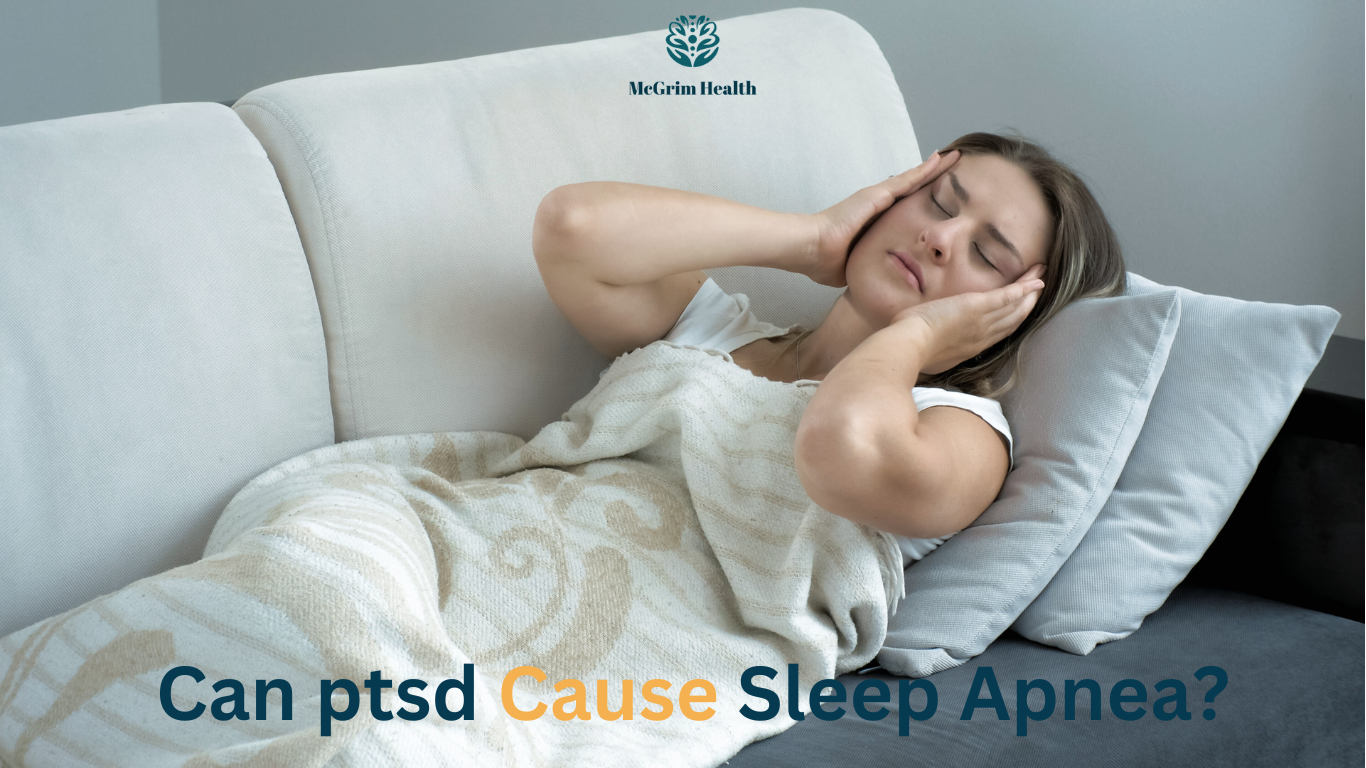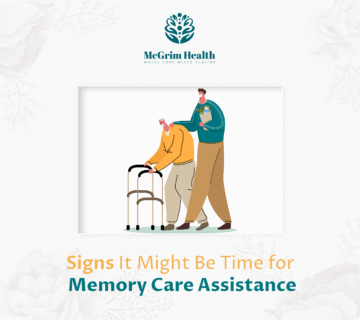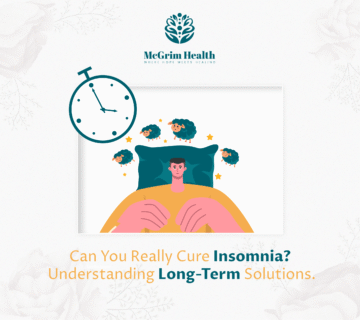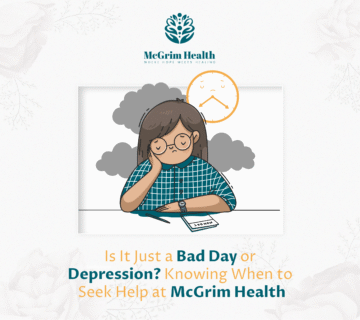Having Post Traumatic Stress Disorder (PTSD) can be a challenging journey, impacting much of an individual’s existence.
An exciting link receiving focus lately is between PTSD and insomnia issues, notably sleep apnea.
But can PTSD cause sleep apnea? Below, we’ll look at how these two problems might connect and affect each other.
PTSD and sleep issues are tough to handle. However, McGrim Health can help you live well. So, reach out to us today.
What Is PTSD?
Post-Traumatic Stress Disorder comes about when someone experiences something truly frightening or distressing, such as a mishap or a terrible incident.
It can cause individuals to remain stressed, frightened, or down in the dumps even after settling things.
- Troublesome recollections or nightmares of the ordeal or a sense of reliving it can be signs of PTSD.
- They avoid anything associated with the incident, such as familiar locations or people.
- People feel hopeless, sad, or pessimistic about themselves or life.
- They may also feel anxious, scared, or have trouble sleeping.
What Is Sleep Apnea?
Sleep apnea, a sleep condition, interrupts your rest with constant pauses in breathing. Such disruption not only spoils your sleep but can also bring on health problems and heart disease, notably.
The two main types are:
- Obstructive sleep apnea (OSA)
- Central sleep apnea (CSA)
Treatment often includes lifestyle changes, CPAP machines, or surgery.
The Connection Between Sleep Apnea and PTSD
Sleep Apnea and PTSD are linked. Research shows this. It’s unclear which one causes the other. However, having either increases the risk for the other.
When both are present, they can make each other worse. This leads to more sleep problems, making treatment more complicated. One condition’s effects intensify the impact of the other.
People with PTSD often get obstructive sleep apnea (OSA). OSA affects millions of U.S. adults. But, in those with PTSD, the rate is 50%. Due to this, doctors often test PTSD patients for OSA.
Having both conditions leads to worse outcomes. This includes more severe PTSD symptoms, disrupted sleep, and mood issues. Untreated OSA and PTSD increase the risk of other health problems, such as:
- Irregular heartbeats
- Heart failure
- Heart attacks
- Strokes
- Depression
Can PTSD Cause Sleep Apnea?
It’s unclear if PTSD causes Sleep apnea. But studies suggest a link. One condition might increase the risk of the other.
Having both PTSD and OSA worsens sleep problems. This creates a cycle. Each condition intensifies the other, leading to more sleep issues and severe symptoms.
How Does PTSD Cause Sleep Apnea?
People with the stress disorder PTSD might also have sleep apnea. These two issues are connected through complicated mind-body causes.
PTSD can bring about lots of anxiety, feeling on edge, and nightmares that mess up regular sleep.
This constant stress might worsen sleep apnea. It can cause tight muscles and less stable breathing during sleep.
Plus, the poor sleep and frequent waking up typical in PTSD can make sleep apnea even worse. This creates a loop where each issue makes the other one worse. This can lead to many sleep issues and harm overall health.
Is Sleep Apnea Secondary to PTSD?
Sometimes, sleep apnea can come as a result of PTSD. PTSD may worsen sleep apnea rather than the conditions appearing independently. This holds particularly true for veterans whose military experiences expose them to intense stress.
Sleep Apnea and PTSD in Veterans
Many veterans with PTSD also have sleep problems. Sleep apnea can worsen this. However, linking these conditions to benefits claims is tricky. This challenge even affects the most deserving veterans.
They must provide clear medical evidence that connects the two conditions. Tools like a Disability Benefits Questionnaire (DBQ) for sleep apnea and a nexus letter from a healthcare provider can help substantiate their claims.
Sleep Apnea and Anxiety Connection
PTSD often brings on anxiety, which may result in a condition known as sleep apnea, otherwise known as secondary anxiety sleep apnea.
This duo can stir up a repetitive cycle where one affects the other adversely. For instance:
- A sudden gasp for air upon waking might spark a panic attack.
- Panic attacks make resuming sleep a difficult task.
- This repetitive pattern escalates anxiety and hampers sleep quality.
Grasping this connection aids in improved treatment of both ailments.
Can PTSD Cause GERD and Other Related Conditions?
Yes, it’s true. PTSD genuinely leads to GERD (Gastroesophageal Reflux Disease) and similar issues.
Stress and worry from PTSD can disturb the natural workings of your gut. This potentially results in uncomfortable signs like acid reflux and heartburn.
The stress from PTSD causes your stomach to make extra acid and weakens your esophagus’ lower end, making GERD worse.
PTSD might also trigger digestive problems like IBS and dyspepsia. Considering that stress influences your gut, managing PTSD effectively is essential. Acknowledging its effects on your physical health is critical to mitigate related conditions.
Sleep Apnea and Traumatic Brain Injury
Another health concern tied to sleep apnea could be traumatic brain injury (TBI).
So, can a TBI cause sleep apnea? It can. Damage to the head impacts the brain’s capacity to manage sleep and breathe.
This can result in sleep apnea. This is highly significant for veterans. They might have suffered head traumas during their service time.
Sleep Apnea Treatment
For sleep apnea, the primary treatment is continuous positive airway pressure (CPAP) therapy. This therapy improves airflow during sleep. In addition to CPAP, the following lifestyle changes can help:
- Weight loss
- Avoiding alcohol
- Maintaining a regular sleep schedule
Conclusion
To sum up, can PTSD cause sleep apnea? PTSD and sleep apnea can impact a person’s quality of life.
While PTSD isn’t a direct sleep apnea cause, its stress, worry, and physical changes can play a part in sleep apnea’s start or progress.
Catching and treating these issues early boosts sleep quality and overall health.
Knowing the PTSD and sleep apnea link, people can act to control their symptoms and uplift their life quality.
FAQs
Can head trauma cause sleep apnea?
Yes, an injury to the head could trigger sleep apnea. This happens when the brain’s sleep-breathing control gets damaged. Usually, it’s because of harm to the areas that manage our breathing.
Does PTSD get worse with age?
As we age, PTSD signals can become more intense. Especially if not treated or if other life struggles fuel it. Getting older might increase the chance of symptoms linked to trauma.
Can sleep apnea cause nightmares?
Yes, sleep apnea could cause nightmares. It throws off sleep cycles, impacting REM sleep, the stage of sleep where we dream vividly and have nightmares.





No comment